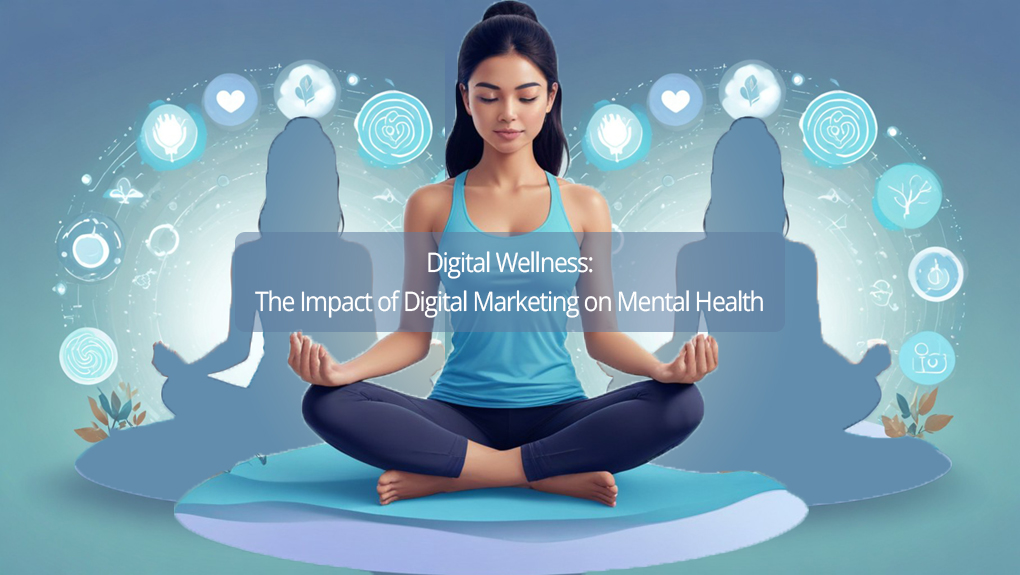|
Getting your Trinity Audio player ready...
|

In an increasingly digital world, the proliferation of digital marketing has transformed how businesses interact with consumers. While the benefits of digital marketing for businesses are undeniable, it is crucial to recognize and address its impact on mental health. This article delves into the relationship between digital marketing and mental health, explores the potential negative effects, and proposes strategies for promoting healthy digital consumption habits.
The Intersection of Digital Marketing and Mental Health
Digital marketing encompasses various strategies, including social media advertising, email campaigns, influencer partnerships, and targeted content. These methods are designed to engage users, foster brand loyalty, and drive sales. However, the omnipresent nature of digital marketing can influence consumers’ mental health in significant ways.
The Positive Side of Digital Marketing
- Connection and Community: Digital marketing can create online communities where individuals feel connected and supported. Social media platforms, for instance, allow users to interact with like-minded individuals, which can foster a sense of belonging and community.
- Access to Information: Digital marketing provides access to a wealth of information and resources. Educational content, health tips, and inspirational stories can positively impact mental well-being by offering support and knowledge.
- Convenience and Accessibility: Online shopping and services can reduce stress by providing convenience and accessibility. Consumers can purchase products, access services, and find information quickly and easily, saving time and reducing the stress associated with traditional shopping and information-seeking methods.
The Negative Side of Digital Marketing
- Information Overload: The constant barrage of information can overwhelm consumers, leading to anxiety and stress. The pressure to keep up with an endless stream of content can contribute to a feeling of being constantly behind or missing out.
- Comparison Culture: Social media marketing often promotes an idealized version of life, leading to unhealthy comparisons. Seeing curated, polished images of others’ lives can result in feelings of inadequacy, low self-esteem, and depression.
- Addictive Behaviors: Digital marketing techniques, such as push notifications and personalized content, are designed to keep users engaged. This can lead to excessive screen time and addictive behaviors, negatively impacting mental health and overall well-being.
- Privacy Concerns: The collection of personal data for targeted marketing raises privacy concerns and can lead to a lack of trust. The feeling of being constantly monitored can cause anxiety and stress.
Understanding the Psychological Mechanisms
To effectively address the impact of digital marketing on mental health, it’s essential to understand the psychological mechanisms at play.
Social Comparison Theory
Social comparison theory posits that individuals determine their own social and personal worth based on how they stack up against others. In the context of digital marketing, this theory explains why people may feel inadequate when comparing themselves to the seemingly perfect lives presented online.
Fear of Missing Out (FOMO)
FOMO is the anxiety that an exciting or interesting event may currently be happening elsewhere. Digital marketing exacerbates FOMO by constantly showcasing events, products, and experiences that others are enjoying, making individuals feel left out or inadequate.
Dopamine and Reward Systems
Digital marketing tactics often exploit the brain’s reward system by providing intermittent rewards (likes, comments, new content). This triggers the release of dopamine, a neurotransmitter associated with pleasure and reward, leading to addictive behaviors as individuals seek more of these positive stimuli.
Confirmation Bias
Confirmation bias is the tendency to search for, interpret, and remember information that confirms one’s preconceptions. Personalized digital marketing can reinforce this bias by showing users content that aligns with their existing beliefs, potentially leading to a narrowed worldview and increased polarization.
Strategies for Promoting Healthy Digital Consumption Habits
Promoting digital wellness requires a multifaceted approach involving individuals, marketers, and policymakers. Here are strategies to foster healthier digital consumption habits:
For Individuals
- Set Boundaries: Establish clear boundaries for digital device usage. Designate specific times for checking emails and social media, and avoid using devices during meals or before bedtime.
- Mindful Consumption: Practice mindfulness by being present and aware of digital interactions. Reflect on the purpose of your digital engagement and its impact on your well-being.
- Digital Detox: Regularly disconnect from digital devices to recharge. Designate “tech-free” times or days to engage in offline activities that promote relaxation and mental health.
- Curate Content: Be selective about the digital content you consume. Unfollow accounts that trigger negative emotions and subscribe to content that inspires and uplifts you.
- Engage in Real-life Interactions: Prioritize face-to-face interactions over digital ones. Building strong, real-life relationships can mitigate the negative effects of excessive digital consumption.
For Marketers
- Ethical Marketing Practices: Adopt ethical marketing practices that prioritize the well-being of consumers. Avoid manipulative tactics that exploit psychological vulnerabilities.
- Transparency: Be transparent about data collection and usage. Clearly communicate how consumer data is used and provide options for users to control their data.
- Promote Positive Content: Create and share content that promotes positivity, mental health, and well-being. Highlight authentic, relatable stories rather than idealized versions of reality.
- Encourage Breaks: Design campaigns that encourage users to take breaks from digital devices. Promote offline activities and balance between digital engagement and real-life experiences.
- Support Mental Health Initiatives: Partner with mental health organizations to raise awareness and support mental health initiatives. This can enhance brand reputation and demonstrate social responsibility.
For Policymakers
- Regulation and Guidelines: Implement regulations and guidelines that promote ethical digital marketing practices. Ensure that marketers adhere to standards that protect consumer mental health.
- Privacy Protections: Strengthen privacy protections to safeguard consumer data. Ensure that individuals have control over their personal information and are informed about data usage.
- Public Awareness Campaigns: Launch public awareness campaigns to educate consumers about the potential mental health impacts of digital marketing and promote healthy digital habits.
- Research and Funding: Support research into the mental health effects of digital marketing and fund initiatives that aim to mitigate negative impacts.
- Digital Literacy Programs: Develop digital literacy programs to educate individuals, especially young people, about responsible digital consumption and the importance of mental health.
In a Nutshell
The impact of digital marketing on mental health is a critical issue that warrants attention from all stakeholders—individuals, marketers, and policymakers. While digital marketing offers numerous benefits, it also presents challenges that can affect mental well-being. By understanding the psychological mechanisms at play and implementing strategies to promote healthy digital consumption habits, we can mitigate the negative effects and enhance the positive aspects of digital marketing.
In our digital age, fostering digital wellness is not just a personal responsibility but a collective effort. Through mindful consumption, ethical marketing practices, and supportive policies, we can create a digital environment that prioritizes mental health and well-being. As we navigate the complexities of digital marketing, let us strive for a balance that allows us to enjoy the benefits of digital engagement while safeguarding our mental health.




